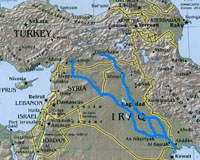| . |  |
. |
Beijing (UPI) Jun 16, 2009 Beijing achieved and largely exceeded drinking-water and waste-management goals it set as part of its bid for last summer's Olympics, a report indicates. China's capital treated nearly 92 percent of its wastewater during the 2008 Games thanks to a major expansion of its treatment facilities. "Beijing prepared impressively in these areas for the Olympic Games. In the end, the city improved its drinking water, as well as its waste-disposal and recycling systems," Cy Jones, a senior associate at the World Resources Institute, said last week in Beijing. Jones was the lead author for two chapters in the report, titled "Independent Environmental Assessment: Beijing 2008 Olympics Games," produced by the U.N. Environment Program. Improvement in water-treatment facilities is important. A 2006 estimate from China's State Environmental Protection Agency stated that 60 percent of the country's rivers suffer from pollution to such an extent that they cannot be used as drinking-water sources. The agency has noted that the Haihe River, which flows through Beijing, suffered severe pollution. A report, "The Cost of Pollution in China," published by the World Bank in 2007 said that pollution scandals in the country demonstrate pollution could be a source of local unrest. If pollution spreads across boundaries of administrative jurisdictions, it can cause "environmental and economic damage as well as public concern and the potential for social unease." The World Bank report estimated that around 750,000 people die in China each year because of pollution. The WRI's research for the U.N. report, covering the water and waste chapters, found that the city's drinking-water treatment plants met China's new water-quality standards and guidelines set by the World Health Organization. Jones said that China's efforts set an example for other host cities. "Though many more actions are needed to ensure the long-term sustainability of its water supply, Beijing's aggressive efforts before the Olympics show that it's possible for cities to minimize water consumption, maximize the use of available rainwater and treated wastewater, and protect critical surface-water resources," said Jones. Beijing surpassed its goal of sorting 50 percent and recycling 30 percent of all solid waste produced within the city by 2008. Capacity for proper disposal of hazardous waste in specially designed landfill sites was also greatly increased, the report said. In 2001 four plants could properly dispose of 2,000 tons of hazardous waste a day. That was raised to 30,000 tons by 2008. "A big step forward has been made by the Beijing municipality in terms of waste disposal and recycling," said Hanqian Zhang, a WRI researcher and report co-author in Beijing. "Olympic bid commitments were achieved through effective infrastructure investment, wise urban planning, technology research and education programs." Data for the WRI chapters in the report was provided by the Beijing Municipal Government, the Beijing Environmental Protection Bureau and the Beijing Olympic Organizing Committee. Share This Article With Planet Earth
Related Links Water News - Science, Technology and Politics
 Iraq faces summer water shortage disaster
Iraq faces summer water shortage disasterBaghdad (UPI) Jun 15, 2009 Iraq is headed for an agricultural disaster this summer unless Turkey releases more water from dams on the Euphrates River, an Iraqi minister warned. Water Resources Minister Abdul-Latif Jamal Rasheed told media outlets that officials from Iraq and Turkey, where the Euphrates originates and flows through Syria, must sit down to settle the long-running dispute over river water volumes. ... read more |
|
| The content herein, unless otherwise known to be public domain, are Copyright 1995-2009 - SpaceDaily. AFP and UPI Wire Stories are copyright Agence France-Presse and United Press International. ESA Portal Reports are copyright European Space Agency. All NASA sourced material is public domain. Additional copyrights may apply in whole or part to other bona fide parties. Advertising does not imply endorsement,agreement or approval of any opinions, statements or information provided by SpaceDaily on any Web page published or hosted by SpaceDaily. Privacy Statement |